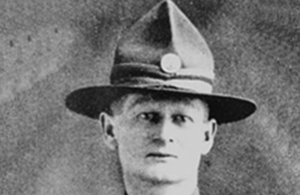WW1 New Zealand VC recipient Reginald Stanley Judson
The story of New Zealand First World War Victoria Cross recipient Reginald Stanley Judson.

Reginald Stanley Judson [Credit: © IWM (detail of VC 663)]
16 men from New Zealand received the Victoria Cross, Britain’s highest award for gallantry, during the First World War. As part of the Centenary Commemorations the people of the United Kingdom marked their gratitude to those courageous men by presenting a bronze memorial plaque to their home country engraved with their names. The plaque is now displayed in the grounds of the New Zealand Parliament, Wellington. This archive tells their stories.
Name: Reginald Stanley Judson
DOB: 29 September 1881
Place of Birth: Wharehine, New Zealand
Date of Action: 26 August 1918
Place of Action: near Bapaume, France
Rank: Sergeant
Regiment: 1st Battalion, Auckland Infantry Regiment, New Zealand Expeditionary Force
Reginald Stanley Judson was born on 29 September 1881 in Wharehine, New Zealand. He was married with four children and working as an engineer when he enlisted in the New Zealand Expeditionary Force in October 1915. In September 1916, he fought with the 1st Battalion Auckland Infantry Regiment in the Battle of Flers-Courcelette and took almost two years to recover from his wounds.
Sergeant Judson returned to the Western Front in June 1918. In a four week period in July-August 1918, he received the Distinguished Conduct Medal, the Military Medal and the Victoria Cross, the latter awarded for his actions on 26 August 1918 at the Second Battle of Bapaume. His citation reads:
For most conspicuous bravery and devotion to duty when, in an attack on enemy positions, he led a small bombing party under heavy fire and captured an enemy machine-gun. He then proceeded up the sap alone, bombing three machine-gun crews before him. Jumping out of the trench he ran ahead of the enemy. Then, standing on the parapet, he ordered the party, consisting of two officers and about ten men, to surrender. They instantly fired on him, but he threw a bomb and jumped down amongst them, killed two, and put the rest to flight, and so captured two machine-guns. This prompt and gallant action not only saved many lives, but also enabled the advance to be continued unopposed.
After the war, Judson remained in the army. He served on the Home Front in the Second World War, and later became a farmer. He died aged 90 in 1972.